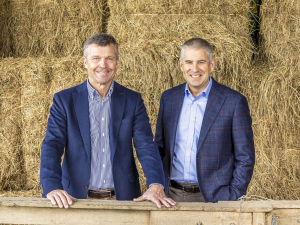Another record milk price for Tatua suppliers
Independent Waikato milk processor Tatua has set another new record for conventional farmgate milk price paid to New Zealand farmers.
 Tatua chairman Stephen Allen (left) and chief executive Brendhan Greaney say they are pleased to report another good year.
Tatua chairman Stephen Allen (left) and chief executive Brendhan Greaney say they are pleased to report another good year.
Another season, another record milk payout from Tatua.
The dairy co-operative has paid its 101 shareholder farms a whopping $12.30/kgMS for milk supplied last season, again leaving Fonterra and other processors in the dust in the payout stakes.
Morrinsville-based Tatua's earnings for the 2022-23 season equated to $15.20/kgMS before retention. The co-op has retained $2.90/kgMS or $43 million for reinvestment in the business.
Last year, Tatua paid its suppliers $11.30/kgMS, retaining $1.35/kgMS.
Fonterra last month announced a final milk price of $8.22/kgS plus a dividend of 50c/share.
It was at pains to point out that it returned 50c/share to shareholders and unit holders, giving a final cash payout to farmers of $9.22 per share-backed kgMS.
In a joint statement, Tatua chairman Stephen Allen and chief executive Brendhan Greaney say they are pleased to report that Tatua has had another good year.
"In deciding our payout, we have sought to balance the needs of our shareholders' farming businesses, in an environment where costs have increased well beyond mainstream inflation, and our need to continue to invest in the business while also maintaining balance sheet strength."
Tatua's gearing ratio averaged 21.7% for the year, but lowered to 16% at balance date, following the sale of higher than typical inventory levels.
The company added that in addition to achieving record income and earnings, good progress has been made in many areas of the business - including a number of significant capital projects and business improvement initiatives.
"Our teams in New Zealand and in our offshore subsidiaries have continued to demonstrate their commitment and dedication to the business and this is reflected in all that has been achieved," Allen and Greaney says.
Tatua's income reached a record $537 million, with earnings available for a payout of $225 million.
"Revenue from our bulk ingredients business of caseinate, whey protein concentrate (WPC) and anhydrous milkfat (AMF) was the highest ever, buoyed by global dairy protein prices, which contributed significantly to our earnings uplift."
However, the company warns that prices have subsequently fallen, which will result in more typical earnings over the year ahead.
"The bulk ingredients revenue uplift coincided with combined revenue from our inherently more stable specialised nutritionals, foods and flavours businesses also reaching a new high, and making a valuable contribution to overall earnings."
Tatua processed 14.85 million kgMS last season, 1% higher than the previous season. However, it says the season was a game of two halves.
"Wet conditions and lack of sunshine early in the season severely impacted supply, with milk received over the peak supply period 6.6% behind.
"Fortunately, those same wet conditions helped boost milk supply later in the season, to end 1% higher than the previous season overall."
Changed logos on shirts otherwise it will be business as usual when Fonterra’s consumer and related businesses are expected to change hands next month.
Reflecting on the past year, Horticulture New Zealand chief executive Kate Scott says there has been a lot to celebrate.
Ministry for Primary Industries (MPI) Director General Ray Smith is giving a big shout-out to the horticulture sector, especially kiwifruit.
Early forecasts for New Zealand's apples and pears point to a standout season marked by exceptional fruit quality and high pack-out rates.
Tickets are now available for Beef + Lamb New Zealand’s (B+LNZ) Out the Gate, returning from 19-21 May 2026 at Te Pae, Christchurch.
Dairy Women's Network (DWN) is welcoming AgriHealth as a new partner.